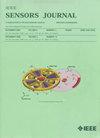GSMDV-Hop:一个模块化和基于贪婪策略的框架,用于提高DV-Hop定位精度和稳定性
IF 4.3
2区 综合性期刊
Q1 ENGINEERING, ELECTRICAL & ELECTRONIC
引用次数: 0
摘要
本文针对距离矢量跳(DV-Hop)模型不能满足定位精度要求和缺乏灵活应用扩展的鲁棒角色分析机制的局限性,提出了一种创新的解决方案。通过集成预实验机制和多维评价体系,对模型进行系统解构和改进,开发出模块化、贪心策略模块化DV-Hop(简称GSMDV-Hop)。该方法采用实验前测试,通过贪心策略识别每个模块内的最优性能函数。引入二进制控制器将这些模块无缝集成,实现灵活控制,形成具有可调基准和多种性能指标的多维评估框架。实验结果表明,加入优化模块后,定位误差平均降低50%,峰值优化率超过70%。该算法在优化效率、稳定性和通用性方面明显优于现有方法,使其成为各种物联网(IoT)应用中高级定位任务的令人信服的选择。本文章由计算机程序翻译,如有差异,请以英文原文为准。
GSMDV-Hop: A Modularized and Greedy-Strategy-Based Framework for Enhanced DV-Hop Localization Accuracy and Stability
In this work, an innovative solution to address the limitations of the distance vector hop (DV-Hop) model, which fails to meet localization accuracy requirements and lacks a robust role analysis mechanism for flexible application expansion, is proposed. By integrating a pre-experimentation mechanism and a multidimensional evaluation system, the model is systematically deconstructed and improved, resulting in the development of a modularized and greedy strategy modular DV-Hop (referred to as GSMDV-Hop). The proposed approach uses pre-experimental tests to identify optimal performance functions within each module through a greedy strategy. A binary controller is introduced to seamlessly integrate these modules, enabling flexible control and forming a multidimensional evaluation framework with adjustable benchmarks and diverse performance indicators. The experimental results indicate that the incorporation of optimized modules reduces the localization error by an average of 50%, with peak optimization rates exceeding 70%. The proposed algorithm significantly outperforms existing methods in terms of optimization effectiveness, stability, and versatility, making it a compelling choice for advanced localization tasks in diverse Internet-of-Things (IoT) applications.
求助全文
通过发布文献求助,成功后即可免费获取论文全文。
去求助
来源期刊

IEEE Sensors Journal
工程技术-工程:电子与电气
CiteScore
7.70
自引率
14.00%
发文量
2058
审稿时长
5.2 months
期刊介绍:
The fields of interest of the IEEE Sensors Journal are the theory, design , fabrication, manufacturing and applications of devices for sensing and transducing physical, chemical and biological phenomena, with emphasis on the electronics and physics aspect of sensors and integrated sensors-actuators. IEEE Sensors Journal deals with the following:
-Sensor Phenomenology, Modelling, and Evaluation
-Sensor Materials, Processing, and Fabrication
-Chemical and Gas Sensors
-Microfluidics and Biosensors
-Optical Sensors
-Physical Sensors: Temperature, Mechanical, Magnetic, and others
-Acoustic and Ultrasonic Sensors
-Sensor Packaging
-Sensor Networks
-Sensor Applications
-Sensor Systems: Signals, Processing, and Interfaces
-Actuators and Sensor Power Systems
-Sensor Signal Processing for high precision and stability (amplification, filtering, linearization, modulation/demodulation) and under harsh conditions (EMC, radiation, humidity, temperature); energy consumption/harvesting
-Sensor Data Processing (soft computing with sensor data, e.g., pattern recognition, machine learning, evolutionary computation; sensor data fusion, processing of wave e.g., electromagnetic and acoustic; and non-wave, e.g., chemical, gravity, particle, thermal, radiative and non-radiative sensor data, detection, estimation and classification based on sensor data)
-Sensors in Industrial Practice
 求助内容:
求助内容: 应助结果提醒方式:
应助结果提醒方式:


